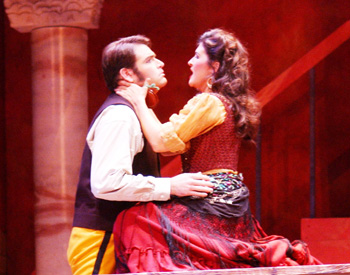![[Metroactive Stage]](/stage/gifs/stage468.gif)
[ Stage Index | Silicon Valley | Metroactive Home | Archives ]
By Don's Early Light: Adam Flowers and Michele Detwiler in 'Carmen.'
Show Bizet
Opera San José showcased its sopranos in 'Carmen'
By Scott MacClelland
IF EVER an opera tested the acting abilities of its principal singers—and vice versa—it is the Bizet favorite, Carmen. In the Opera San José production Sunday at the California Theatre—the first performance in this run by the alternate cast—both the acting and singing were tested. On the acting side, Adam Flowers' Don José was somehow instantly and fatally in love with the previously rejected Carmen of Michele Detwiler, without evidence of such vulnerability leading up to that epiphany. On the singing side, Detwiler's Carmen at times struggled to stay in tune even while carving a magnetic Gypsy character. Jason Detwiler's Escamillo was, for him, unusually tight and uneasy, resulting in episodes of rhythmic insecurity and a loss of his customary vocal authority.
Nevertheless, an enthusiastic matinee audience forgave the few miscues and rewarded the performance with generous applause. Certainly the cast got a strong foundation from conductor George Cleve, who also whipped the small orchestra into powerful outbursts and sizzling tempi that made it equal to anything on stage.
The challenge and treacheries of Carmen, like most French lyric opera, lie in the vocal production, where the singing line calls for a peculiarly French technique, consisting of agility, lightness, transparency and, in particular, delicacy. (In his bull-in-a-china-shop performance of the "Flower Song," the great Placido Domingo was utterly unable to tame down that dramatic instrument to the lyrical lightness it requires.)
While the aforementioned principals carried their roles generally to success, the standouts were the sopranos: Lori Decter as Micaela, Kimarie Torre as Frasquita and mezzo Heidi Rae Kalina as Mercedes. On the basis of this appearance, I would say that Torre especially has a rosy future in opera, with a sure technique and distinctive tonal bloom that served her dramatic interpretation effortlessly and with beguiling grace.
The chorus and youth choruses (Cantabile and Ragazzi) and dancers, who could fill the stage one moment and totally vacate it the next, added considerable exuberance to the performance. Giulio Cesare Perrone's set design played out between sturdy brick bulwarks right and left. This proved most successful in the Act 2 taverna, subterranean with windows across the top at street level and a long descending stairway across the back wall.
The act also maximized the effect of David Cox's stage direction. Linking the heavy walls were arch-topped columns inspired by the Moorish architecture of the great mosque at Cordoba. The opera's new scene shop has not held back in exploiting the California's deep stage and high proscenium, though some scenes in its recent productions have worked better than others. In the first scene of Act 3, the brick walls framed the smuggler's hideout, a large rocky outcrop. Of course, the walls shouldn't have been there at all, but the lighting kept attention on the staging, until suddenly and unintentionally the sun came out (so to speak) on the foreground, destroying the effect. For the final scene, outside the bullring, the set worked nearly as well as it did in Act 2. Julie Engelbrecht's costumes served the scenario well though the black and yellow dragoon uniforms were garish and seemed more appropriate for a comedy.
[ Silicon Valley | Metroactive Home | Archives ]
Copyright © Metro Publishing Inc. Metroactive is affiliated with the Boulevards Network.
For more information about the San Jose/Silicon Valley area, visit sanjose.com.
![]()

Photograph by Pat Kirk
Carmen, an Opera San José production, plays Feb. 10, 12, 15 and 18 at 8pm and Feb. 13 and 20 at 3pm at the California Theatre, 345 S. First St., San Jose. Tickets are $60-$88. (408.437.4450)
Send a letter to the editor about this story to letters@metronews.com.
From the February 9-15, 2005 issue of Metro, Silicon Valley's Weekly Newspaper.